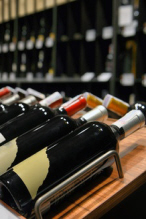Christmas Day Off-Sales
- Details
 Professor Roy Light looks at some of the issues raised by restrictions on alcohol off-sales on Christmas Day.
Professor Roy Light looks at some of the issues raised by restrictions on alcohol off-sales on Christmas Day.
If no variation was sought specifically to remove them, conditions on justices’ and public entertainment licences were embedded on premises licences converted under the transitional provisions of the Licensing Act 2003. Many of these were unnecessary and inappropriate. Unless removed by subsequent variation a significant number of licences remain cluttered with these pointless conditions.
Conditions that are redundant are safely ignored and their removal even by way of minor variation may not be thought worthwhile. Yet for those who need to be familiar with the conditions on a licence the presence of a number of superfluous conditions adds unnecessary complication to their task. And what of those conditions which restrict the operation of the business in a way that would not have happened if the licence was granted today?
Applications by way of minor variation have been made by some operators trading under converted justices’ off-licences to remove the closed period from 1500-1900 for alcohol sales on Christmas Day. Some authorities have accepted these applications others have declined to do so and suggested that a full variation application is needed.
While debate continues on the merits and utility of 24 hour licensing, removal of the restriction on alcohol off-sales hours for Christmas day afternoon seems generally to be welcome; particularly as we live in a multi-faith society. A leftover from legislation passed more than 50 years ago, the Licensing Act 1964 provisions were unless varied embedded on conversion into 2003 Act licences.
The 1964 Act hours for off-sales of alcohol, as amended by s.1 Licensing (Sunday Hours) Act 1995, are Monday to Saturday 0800 to 2300 hours; Sunday 1000 to 2230; Christmas Day 1200 to 1500 and 1900 to 2230; and Good Friday 0800 to 2230. Is the closed period from 1500-1900 hours for Christmas Day appropriate for the promotion of the licensing objectives and does it create confusion for the customers and difficulties for staff? The restriction certainly seems to run counter to the Secretary of State’s Guidance which states:
"Shops, stores and supermarkets should normally be free to provide sales of alcohol for consumption off the premises at any times when the retail outlet is open for shopping unless there are good reasons, based on the licensing objectives, for restricting those hours." (para.10.15)
It is hard to see how opening between 1500 and 1900 hours on Christmas Day will undermine the licensing objectives in the absence of any problems encountered by the store trading these hours on the other 364 days of the year. And, of course, whether or not the restricted hours apply depends on whether the licence was granted pre or post 2003. So the restriction is by way of historical anomaly rather than for promotion of the licensing objectives.
Not surprisingly licensing committees generally seem to have no issue with regularisation of Christmas Day hours when dealing with variation applications for longer hours. However, are the cost and effort for both the premises licence holder and the authority of a variation application simply to remove only the Christmas Day afternoon closure unnecessarily burdensome? Is a minor variation application more appropriate?
Applications for minor variation of a premises licence fall within ss.41A to 41C of the Act. The test for determination of a minor variation application, after consultation with such of the responsible authorities as it considers appropriate, is whether the variation could have an adverse effect on promotion of the licensing objectives. As discussed above this is most unlikely to be the case for alcohol off-sales between 1500 and 1900 on Christmas Day.
It also seems that licensing authorities share this view but some consider themselves tied by s.41A(3) which states that a minor variation application cannot be made for specified variations which include an increase in the amount of time on any day during which alcohol may be sold by retail (S.41(3)(e)(ii)). A strict interpretation of this provision may exclude removal of the Christmas Day afternoon closed period. Conversely it may be argued that by allowing removal there is no increase in the amount of time during which alcohol may be sold rather the removal of an historical anomaly that reduced the usual hours for which alcohol may be sold on one particular day of the year.
There is also the de minimis principle. An off-licence with 1964 Act hours would be able to sell alcohol on 52 Sundays (1000-2230) for 650 hours; 311 weekdays (0800-2300) for 4665 hours; Good Friday (0800-2230) for 14.5 hours; and Christmas Day (1200-1500 and 1900-2230) for 6.5 hours. If the variation for Christmas Day was to 1200-2230 this would amount to four hours against a total of 5336 hours or an annual increase of 0.08%. It would, of course, be a 35% increase on Christmas day.
Licensing authorities may consider themselves bound by a literal interpretation of the statute but a purposive approach to reducing the burden and avoiding unnecessary red tape may suggest that the simplified procedure of a minor variation is appropriate for such applications. In any event it is high time that the government acted to remove the anomalous conditions carried over from the old regime into the new.
Happy Christmas.
Roy Light is a specialist licensing barrister who practises from St John’s Chambers, Bristol. He can be contacted
18-03-2026 1:00 pm
22-04-2026 11:00 am
01-07-2026 11:00 am




























